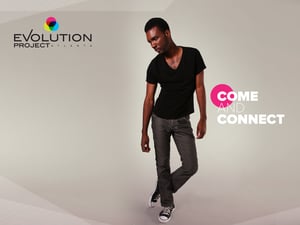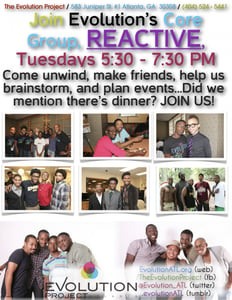Thanks to a grant from the Elton John AIDS Foundation (EJAF), a number of Point Scholars have the wonderful opportunity to intern with organizations that are directly impacting the daily lives of those at risk for, or living with HIV/AIDS. Wells Fargo Point Scholar Marcus Lee tells us about his experience working with Atlanta's Evolution Project:
As part of my internship made possible by EJAF, I participated in an ethical leadership webinar facilitated by Bidisha Banerjee, Program and Curriculum Director of the Dalai Lama Fellows program. The theme of the webinar was “Collaborating Across Differences,” with particular emphases on leadership style and conflict resolution.
Bidisha lead us through a number of exercises that inspired us to think more intentionally about teamwork, conflict, confrontation and the impetus to confront. We discussed love and hate as different intuitive spaces, teased out the potential differences between teamwork and collaboration, exchanged self check-in methods, and parsed through the consequences of different leadership styles. In the end, we left each other with a powerful, yet simple message about leadership, ethics, and considering difference: trust yourself, and humble your ears.

Given that HIV disproportionately affects multiply marginalized communities, being intentional about collaborating across difference is especially important in prevention work. Through EJAF, I have been afforded the opportunity to work with the Evolution Project, a drop-in community center for young Black gay and bisexual men, and trans* individuals. There, I’m working to increase the flow of young Black gay and bisexual men who access the center and its resources. I chose to work with Evolution because of its multifaceted approach to HIV prevention—its staff understands transmission as a behavioral, social and political issue. This dynamic approach is both important for me as a Black gay man and informative for me as an aspiring scholar of Black/Queer histories and social movements.

Although it would seem as if most of the people in the center share common identities (e.g. Black and/or gay, bisexual and/or queer and/or genderqueer/trans*), understanding and intentionally responding to our differences is critical. For example, recent public health research has elucidated class status as a major factor determining one’s vulnerability to HIV; class affects the quality of one’s health care, the security of one’s housing, one’s level of education, one’s ability or inability to access essential drugs, like Pre-exposure Prophylaxis (PreP) and Highly Active Antiretroviral Therapy (HAART), etc. Since the Evolution Project is home to Black/Queer people of all classes, I aim to use the tools I developed during the webinar to collaborate more effectively across class differences.
In short, I’m excited to be adding to the great work that the staff at the Evolution Project is doing—their commitment to Black/Queer people and HIV prevention is beautiful and inspiring. Through working with them, I hope to gain a clearer contextual understanding of the structural issues that facilitate transmission. I’m appreciative of EJAF for the opportunity, and of Bidisha and the Dalai Lama Fellows for reminding me to be self-aware. I look forward to implementing the strategies we developed!
| This post was written by Wells Fargo Point Scholar Marcus Lee |
 Marcus Lee is a member of the Class of 2015 of Morehouse College, a Mellon Mays Research Fellow, and a member of a variety of community organizations and initiatives oriented toward racial justice, gender equity, and sexual liberation. His academic research interests include Black Gay AIDS activism in the ‘80s and LGBTQ grassroots organizing in the U.S. South; and—with those foci—he hopes to one day obtain a Ph.D. and go on to teach at a small, intimate college. Marcus Lee is a member of the Class of 2015 of Morehouse College, a Mellon Mays Research Fellow, and a member of a variety of community organizations and initiatives oriented toward racial justice, gender equity, and sexual liberation. His academic research interests include Black Gay AIDS activism in the ‘80s and LGBTQ grassroots organizing in the U.S. South; and—with those foci—he hopes to one day obtain a Ph.D. and go on to teach at a small, intimate college.
Learn more about Marcus here.
|

